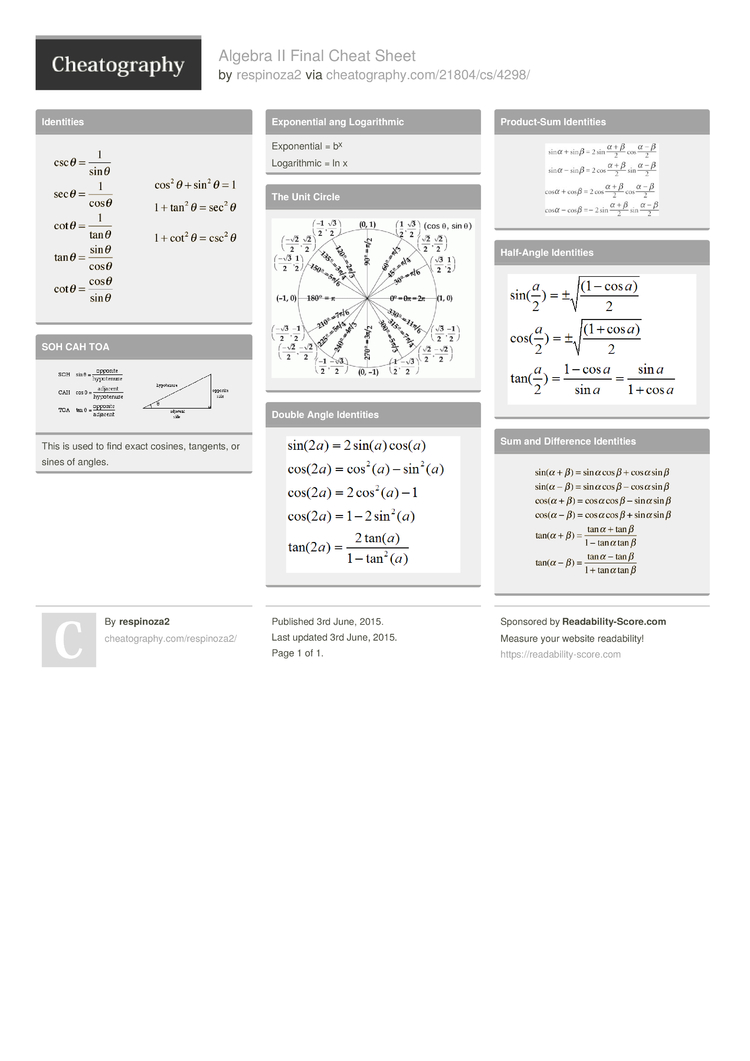Are you prepared for the Algebra 2 final exam? The answer lies in understanding and mastering the essential formulas that can make or break your performance. A strong grasp of these formulas is not just about passing an exam but equipping yourself with tools that are crucial in advanced mathematics. Let’s delve into what you need to know.
Essential formulas for Algebra 2 encompass a wide array of topics, including laws of exponents, quadratic equations, factoring techniques, logarithmic functions, and trigonometric identities. Each formula plays a pivotal role in solving complex problems efficiently. For instance, multiplying powers of the same base involves simply adding the exponents, a straightforward yet powerful concept. Downloading a cheat sheet from reputable institutions like Castleton University can provide you with all the necessary formulas compiled in one place, ensuring you have quick access during study sessions or exams.
| Bio Data | Details |
|---|---|
| Name | Dr. Jane Mathews |
| Date of Birth | March 15, 1978 |
| Place of Birth | New York City, USA |
| Education | Ph.D. in Mathematics from Stanford University |
| Professional Experience | Professor of Mathematics at Castleton University since 2005 |
| Achievements | Published numerous research papers on algebraic structures; Recipient of the National Science Foundation Award |
| Reference Website | Castleton University |
Algebra references and reviews extend beyond simple cheat sheets. They include comprehensive documents that cover everything from basic properties to advanced problem-solving techniques. One such resource is the two-page Intermediate Algebra Final Exam Review, which provides detailed explanations alongside practice questions. This document serves as an excellent companion for students preparing for their Algebra 2 finals, offering insights into common pitfalls and strategies to avoid them.
For those studying AP® Physics 2: Algebra-Based, the relevance of algebra becomes even more pronounced. Concepts such as electricity, capacitance, and electric fields rely heavily on algebraic principles. Understanding these connections helps bridge the gap between theoretical knowledge and practical application, making it easier to tackle physics problems with confidence.
The Algebra Cheat Sheet - Basic Properties and Facts offers a concise summary of key algebraic identities and operations. It includes formulas for expanding binomials, factoring polynomials, and manipulating exponents. Mastery of these concepts enables students to approach problems methodically, breaking down complex expressions into manageable components.
A notable example from this cheat sheet is the factorization of cubic expressions. For instance, \( x^3 + a^3 = (x + a)(x^2 - ax + a^2) \). Such formulas might seem abstract initially, but their utility becomes apparent when applied to real-world scenarios or higher-level mathematics.
TikTok has also become a surprising platform for sharing educational content, including Algebra 2 cheat sheets. These digital resources often present information in engaging formats, appealing to younger audiences who prefer visual learning methods. By incorporating multimedia elements, educators enhance comprehension and retention rates among students.
In preparation for the Algebra 2 Regents exam, there are specific facts every student must know cold. While the official reference sheet provides some guidance, memorizing critical formulas ensures quicker recall during high-pressure situations. Familiarity with quadratic equations, exponential growth models, and trigonometric ratios will undoubtedly contribute to success on standardized tests.
Virginia Department of Education supplements its curriculum with ancillary test materials, including middle school mathematics formula sheets and EOC (End-of-Course) guides for Algebra 1, Geometry, and Algebra 2. These resources align closely with state standards, providing structured frameworks for both teachers and learners alike.
To summarize, effective preparation for Algebra 2 finals involves leveraging multiple sources of information—cheat sheets, online tutorials, practice exams, and collaborative study groups. Engaging deeply with each topic strengthens foundational skills while fostering adaptability in diverse mathematical contexts. Remember, consistency and perseverance remain key ingredients in achieving academic excellence.
As you progress through your studies, remember that understanding the 'why' behind each formula enhances its applicability. Whether solving linear equations or analyzing polynomial functions, maintaining curiosity and seeking deeper insights will lead to greater proficiency in algebraic reasoning. With dedication and the right tools, success in Algebra 2—and beyond—is well within reach.



